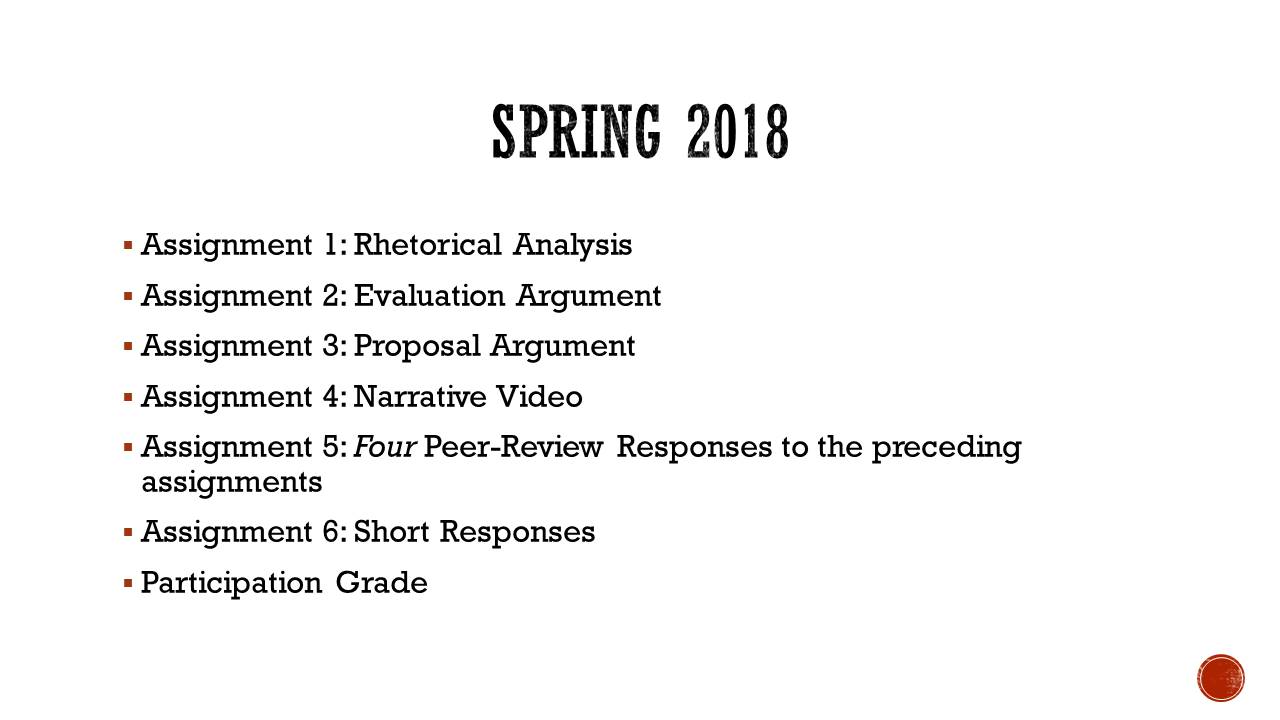Editor’s Note: These notes reference several handouts on topics including various approaches to peer review, effective rubric design and more. For copies of these handouts and descriptions of the assignments being used in the 2018 602 for English 15, please contact the PWR office.
Town Hall Meeting
Notes by Rachel Wiley
November 29 at 4-5pm
Grucci Room
Agenda:
- New College of Liberal Arts Academic Integrity policy,
- New policy on required assignments for English 15 and 30,
- Brief overview/preview of what makes for a good rubric, and
- Brief report by Greg and Paul on revisions to the governance document.
Plagiarism & Academic Integrity Policy
- Report to College of Liberal Arts Office of Academic Integrity
- In January/February they will launch a new website for reporting
Change in Number of Formal Assignments in English 15
| Prior Number | New Option |
| 6 formal assignments = | still 6 formal assignments = |
| 5 formal assignments + | 4 formal assignments + |
| 1 via journals, in-class writing, etc. | 1 set of 4 formal peer review responses + |
| 1 via journals, in-class writing, etc. |
- In 602, Cheryl and the PWR Graduate Assistants have developed 4 different peer review response tactics that have been generative (Cheryl provided them to those in the meeting today; email her for a copy)
- It’s important that students learn how to read someone else’s writing and care about someone else’s writing
- They’ve also developed a new rubric for how to grade peer review responses (email Cheryl for this)
- And a new set of percentages and new syllabus (email Cheryl for this) for Spring 2018
- Assignment 1: Rhetorical Analysis
- Assignment 2: Evaluation Argument
- Assignment 3: Proposal Argument
- Assignment 4: Narrative Video
- This is now the only multi-modal assignment
- Assignment 5: Four Peer-Review Responses to the preceding assignments
- Assignment 6: Short Responses
- Participation Grade
Rubrics
- Good Rubrics
- Articulate our goals for the course
- Cheryl distributed General Education Writing and Speaking (GWS) Course Criteria (email Cheryl for this)
- Rhetorical knowledge
- Capacities in critical thinking, reading, listening, and generating ideas
- Proficiency in composing processes
- Knowledge of communication conventions
- Align with grading standards for the course
- Cheryl distributed the English Department’s Program in Writing and Rhetoric Grading Standards
- Meet the criteria for each assignment
- Gather information that helps students improve
- Cheryl distributed General Education Writing and Speaking (GWS) Course Criteria (email Cheryl for this)
- Minimal rubrics vs. full rubrics
- Articulate our goals for the course
| Minimal rubrics | Full rubrics |
| Name traits | Name traits |
| · Thesis | · Thesis |
| · Intro | · Intro |
| · Organization | · Organization |
| · Conclusion | · Conclusion |
| Describe only the top performance in each criterion | Describe each level of performance |
- Additionally, good rubrics
- Are shared (and maybe developed) with the students before they begin the assignment and
- Have interrater reliability
- Cheryl distributed a sample full rubric (email Cheryl for this)
Governance Document Changes
- Mark charged an ad-hoc committee with updating the department’s Governance Document to reflect the new titles for non-tenure line faculty, as well as the new requirements for promotion process
- In addition to changing nomenclature surrounding title changes, committee has been working on two main priorities:
- Make promotion process more transparent
- Committee is working on firming up a calendar
- Procedure / screening process for putting people forward for promotion is still being worked out (whether committee puts people forward or whether people can put themselves forward)
- Make criteria for promotion more available
- Teaching accomplishments
- Service component
- There aren’t enough opportunities for lecturers to do service
- Committee—and LAC—are actively working to create more service opportunities
- Peer evaluation
- Doc. committee is working on building a regular schedule for evaluation (through PWR)
- There was some talk about moving evaluations of potential non-tenure line promotions into the department’s faculty personnel committee; however, it’s remaining in the department’s Lecturer Review Committee (now called the Non-Tenure Line Review Committee)
- There’s also been talk about creating a position for a non-tenure line faculty member on the department’s administrative committee (which consists of all the program heads)
- Make promotion process more transparent












